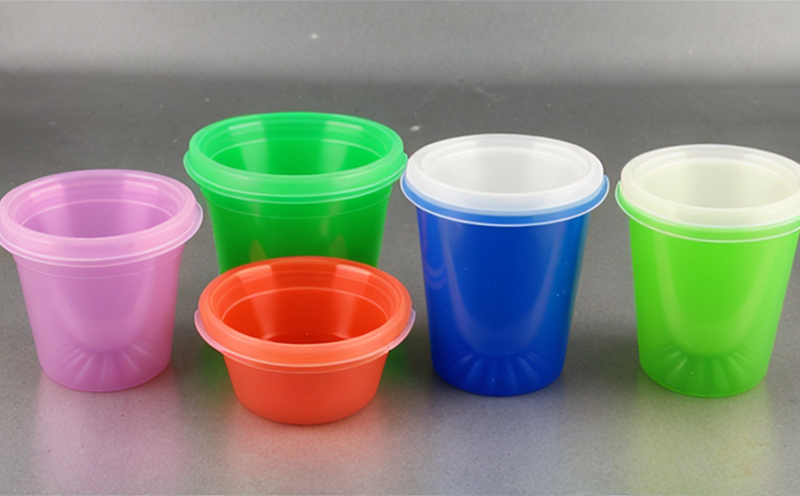DIN 51005 Disposable Plastics Thermal Aging Testing
The DIN 51005 test method for disposable plastics is designed to assess the thermal aging resistance of single-use plastic materials. This standard is particularly crucial in industries such as healthcare, consumer goods, and packaging where the quality and longevity of disposable items are paramount. The aim of this testing protocol is to ensure that these products maintain their structural integrity, chemical stability, and functional performance under typical environmental conditions.
The DIN 51005 test involves subjecting samples to high-temperature exposure for extended periods. This procedure simulates the real-world conditions that disposable plastics might encounter during storage or use. The test is especially important for ensuring that materials used in medical devices, packaging solutions, and consumer goods do not degrade prematurely, leading to potential safety hazards or product failures.
The protocol specifies a range of temperature and time parameters, which are critical for the accurate assessment of thermal aging effects. Compliance with these parameters ensures reliable test results that can be compared across different manufacturers and batches of materials. In addition to temperature exposure, other factors such as humidity levels may also influence the test conditions.
For quality managers and compliance officers, understanding the nuances of DIN 51005 is essential for ensuring product safety and regulatory compliance. R&D engineers can leverage this testing method to refine their formulations and improve material properties. Procurement teams benefit from knowing that suppliers meet stringent standards like DIN 51005, thus enhancing supply chain reliability.
The test results provide valuable insights into the durability of disposable plastics under thermal stress. This information is crucial for optimizing product design and ensuring consistent quality across production batches. By adhering to this standard, manufacturers can demonstrate their commitment to sustainability and safety in the disposal phase of single-use products.
| Parameter | Description |
|---|---|
| Temperature Range | 100°C to 250°C depending on material type |
| Duration | Up to 7 days, with multiple temperature cycles |
| Humidity Levels | Relative humidity up to 93% RH |
| Sample Preparation | Cut samples into standard sizes and shapes |
The DIN 51005 test ensures that disposable plastic products meet stringent quality standards. This is particularly important in sectors where product safety, durability, and environmental impact are critical considerations.
Applied Standards
The DIN 51005 test aligns with international standards such as ISO 178 and ASTM D6483, which also focus on the thermal aging of polymers. These standards provide a framework for consistent testing practices across different regions and industries. By adhering to these guidelines, laboratories ensure that their results are comparable and accepted globally.
The DIN 51005 standard is widely recognized in Europe and internationally. It is particularly relevant for manufacturers operating within the European Union (EU) or those seeking compliance with EU directives on single-use plastics. The test protocol has been developed to address specific concerns related to the environmental impact of disposable plastics, making it a key component of sustainable manufacturing practices.
Compliance with DIN 51005 is essential for manufacturers aiming to meet regulatory requirements and ensure product safety. This standard helps establish trust among consumers, healthcare professionals, and regulators by demonstrating a commitment to quality and sustainability.
Scope and Methodology
The DIN 51005 test method is designed to evaluate the thermal aging resistance of disposable plastic materials. The scope includes the assessment of physical properties, chemical stability, and dimensional changes over time under high-temperature conditions.
The methodology involves exposing samples to a controlled environment that mimics real-world storage or use conditions. This process typically consists of multiple temperature cycles within specified ranges (100°C to 250°C) for durations up to 7 days. The test also includes monitoring the relative humidity levels, which can influence the aging process.
After exposure, samples are analyzed using a range of techniques to determine changes in physical properties such as tensile strength, impact resistance, and flexibility. Chemical stability is assessed through Fourier Transform Infrared Spectroscopy (FTIR) or Gas Chromatography-Mass Spectrometry (GC-MS). Dimensional changes are measured using precision calipers.
The results of these analyses provide a comprehensive picture of the thermal aging behavior of the material. This information is crucial for optimizing product design and ensuring consistent quality across production batches. By adhering to this standard, manufacturers can demonstrate their commitment to sustainability and safety in the disposal phase of single-use products.
International Acceptance and Recognition
The DIN 51005 test method is widely recognized for its rigorous approach to evaluating the thermal aging resistance of disposable plastics. It is particularly relevant in sectors where product safety, durability, and environmental impact are critical considerations.
Compliance with this standard ensures that manufacturers meet stringent quality standards, which is essential for ensuring product safety and regulatory compliance. The test results provide valuable insights into the durability of disposable plastics under thermal stress. This information is crucial for optimizing product design and ensuring consistent quality across production batches.
The DIN 51005 test aligns with international standards such as ISO 178 and ASTM D6483, which also focus on the thermal aging of polymers. These standards provide a framework for consistent testing practices across different regions and industries. By adhering to these guidelines, laboratories ensure that their results are comparable and accepted globally.
The DIN 51005 standard is particularly relevant for manufacturers operating within the European Union (EU) or those seeking compliance with EU directives on single-use plastics. The test protocol has been developed to address specific concerns related to the environmental impact of disposable plastics, making it a key component of sustainable manufacturing practices.
Compliance with DIN 51005 is essential for manufacturers aiming to meet regulatory requirements and ensure product safety. This standard helps establish trust among consumers, healthcare professionals, and regulators by demonstrating a commitment to quality and sustainability.





